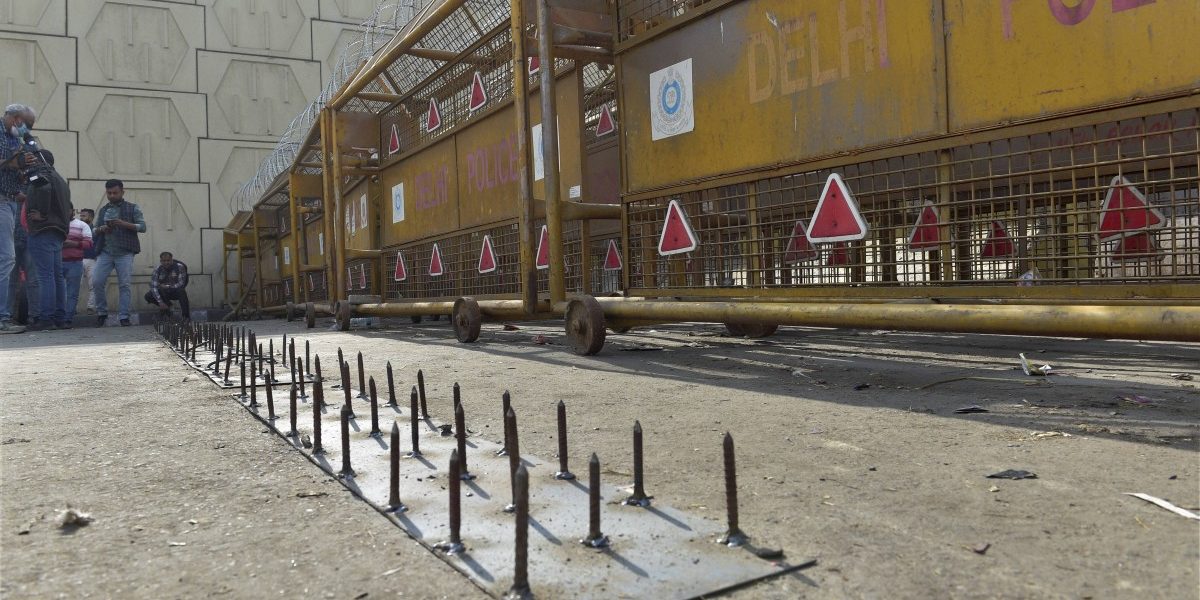New Delhi: The Centre has amped its offensive against protesting farmers by constructing concrete barriers surrounding the Ghazipur, Singhu, and Tikri borders – effectively transforming these two-month long agitation sites into open prisons.
Photographs of police personnel driving nails into roads, pouring concrete to build nearly six-feet tall barricades, placing heavy metal roadblocks, and fencing entire border areas with concertina wires have flooded social media over the last two days.
Work to barricade the protest sites had started as farmers renewed their resolve to continue protesting after the Uttar Pradesh police had gheraoed the Ghazipur site on January 28, after issuing an ultimatum to vacate the site. Police withdrew it later after Bharatiya Kisan Union leader Rakesh Tikait’s emotional outburst breathed new life into the farmers’ protests. The protests had appeared to dissipate after the Republic Day parade fiasco but thousands of farmers soon arrived from Punjab, Haryana and western Uttar Pradesh, amidst threats and attacks by Hindu rightwing leaders and activists.

Barricades set up at the Delhi-UP Ghazipur border to stop farmers from marching towards the national capital in New Delhi, February 2, 2021.
The extent of barricading can be gauged from the following description of the situation at the Tikri border.
“At Tikri, on the road towards Delhi, the police have overall set up a five-layer security system which begins right behind the main stage at the protest site. The first obstruction consists of two layers of iron barricades. After that, the police have joined rows of cement barricades by filling the space between them with concrete. Beyond that, the police have dug up the road and installed iron spikes. Then, there are large trailers and dumpers serving as the fourth layer. And finally, a set of iron barricades forms the fifth layer of hurdles,” reported Hindustan Times.
The Delhi police’s deputy commissioner of police (outer) A. Koan said that the measures were taken to “instil confidence among the Delhiites” and to reiterate their “commitment to ensure the safety of life and property of citizens”.
His comment came in spite of the fact that a majority of farmers’ unions had already distanced themselves from the section which decided to break pre-approved routes, and reaffirmed that they would continue their protests peacefully until the three controversial farm laws are repealed.
The barricading is not limited to physical fences either. On February 1, several Twitter accounts that had been posting on the farmers’ protests were withheld by the site itself, allegedly on orders of the Centre.
The enhanced security measures, even as mobile internet connectivity continues to remain suspended at all the three border sites, has now prompted a large section of opposition leaders to show renewed solidarity with the agitation.

Delhi Police constructing a concrete barricade at Ghazipur border during the farmers’ protest in New Delhi, January 31, 2021.
On Tuesday, opposition leaders in Rajya Sabha demanded that there should be an immediate discussion on the farm laws and the impasse between the farmers and the Centre. The Congress, Left parties, Trinamool Congress, Dravida Munnetra Kazhagam, Rashtriya Janata Dal and other opposition parties forced two adjournments of proceedings in the pre-noon session of the Upper House of parliament while demanding a discussion on the laws.
Later, many opposition leaders took to Twitter to express solidarity with the farmers.
In a bold response to the multi-layered barriers at the Delhi borders, Congress leader Priyanka Gandhi Vadra said that the prime minister has waged a war against India’s farmers.
Taking up the Twitter move, Rahul Gandhi, in his characteristic line of criticism of the Union government said, “Modi style of governance – Shut them up, Cut them off, Crush them down.”
He also appealed to the Union government to “build bridges, not walls”.
Congress spokesperson Randeep Surjewala tweeted to say that food producers of India are being seen as a threat.
Shiv Sena leader Sanjay Raut also visited Rakesh Tikait at Ghazipur on Tuesday. After his meetings he posted a picture of the two together. “The government should speak to farmers in a proper way. Ego will not help run the country,” Raut told the media.
Samajwadi Party president Akhilesh Yadav took a dig at the Union government’s alleged duplicity of inviting the farmers to talks and at the same time driving nails into roads to restrict their movement.
Aam Aadmi Party went a step ahead and mockingly compared India with China while posting pictures of the security arrangement at the Delhi borders.
Shiromani Akali Dal (Badal) leader Harsimrat Kaur Badal, whose party pulled out of the Modi government on the issue of farm laws and who resigned from the Modi cabinet, appealed to the Centre to “listen” to the farmers, and said her party will continue to stand for farmers’ interests.
https://twitter.com/HarsimratBadal_/status/1356135253690093569
Meanwhile, defying threats, thousands of farmers gathered at Landhadi toll plaza in Haryana as photos of the permanent barriers went viral on social media.
https://twitter.com/PunYaab/status/1356515769803100161
Responding to the developments, the Samyukt Kisan Morcha (SKA), an umbrella body of protesting farmers’ unions, said that the digging of trenches and nails on roads, and temporary internet suspension are part of “attacks” being organised by the government.
“There can be no formal talks with the government until police and administration harassment of different kinds against the farmers’ movement is immediately stopped,” SKA said in a statement, while reiterating that they would settle for nothing less than the repeal of all the three laws.
“…Increased barricading including trench-digging, fixing nails on the roads, barbed wire fencing, closing off of even internal roads, stopping of internet services, orchestrating protests and facilitating the same through BJP-RSS workers, diversion of trains and stopping them before destination stations are all part of multiple attacks being organised by the government, its police and administration against the protesting farmers,” it said.
“It appears that the government is extremely fearful of the rising tide of support for the ongoing protest from different states of India,” the statement read.
#FencinglikeChinaPak and #FarmersProtest trended on Twitter through the day, and thousands highlighted the unprecedented scenes at the national capital’s borders.
































